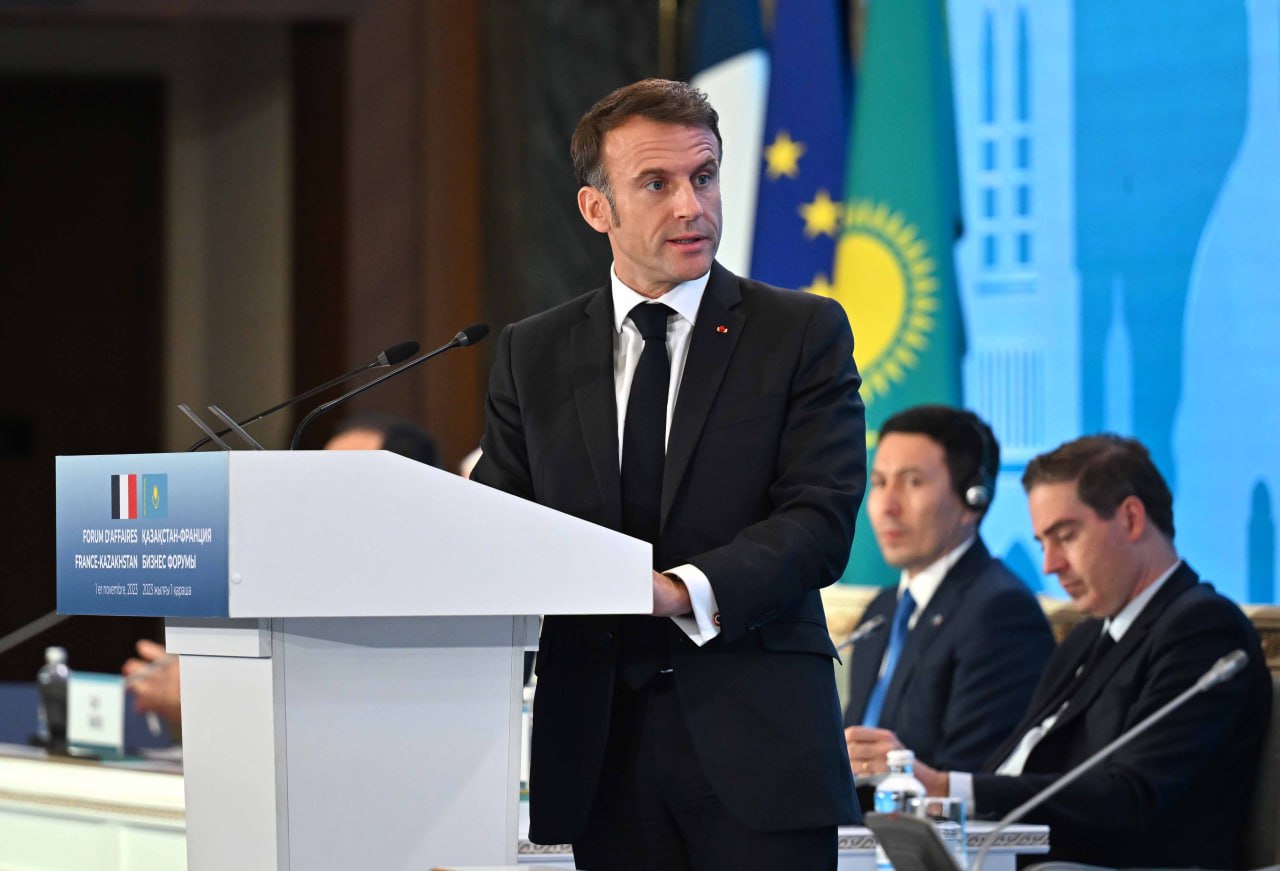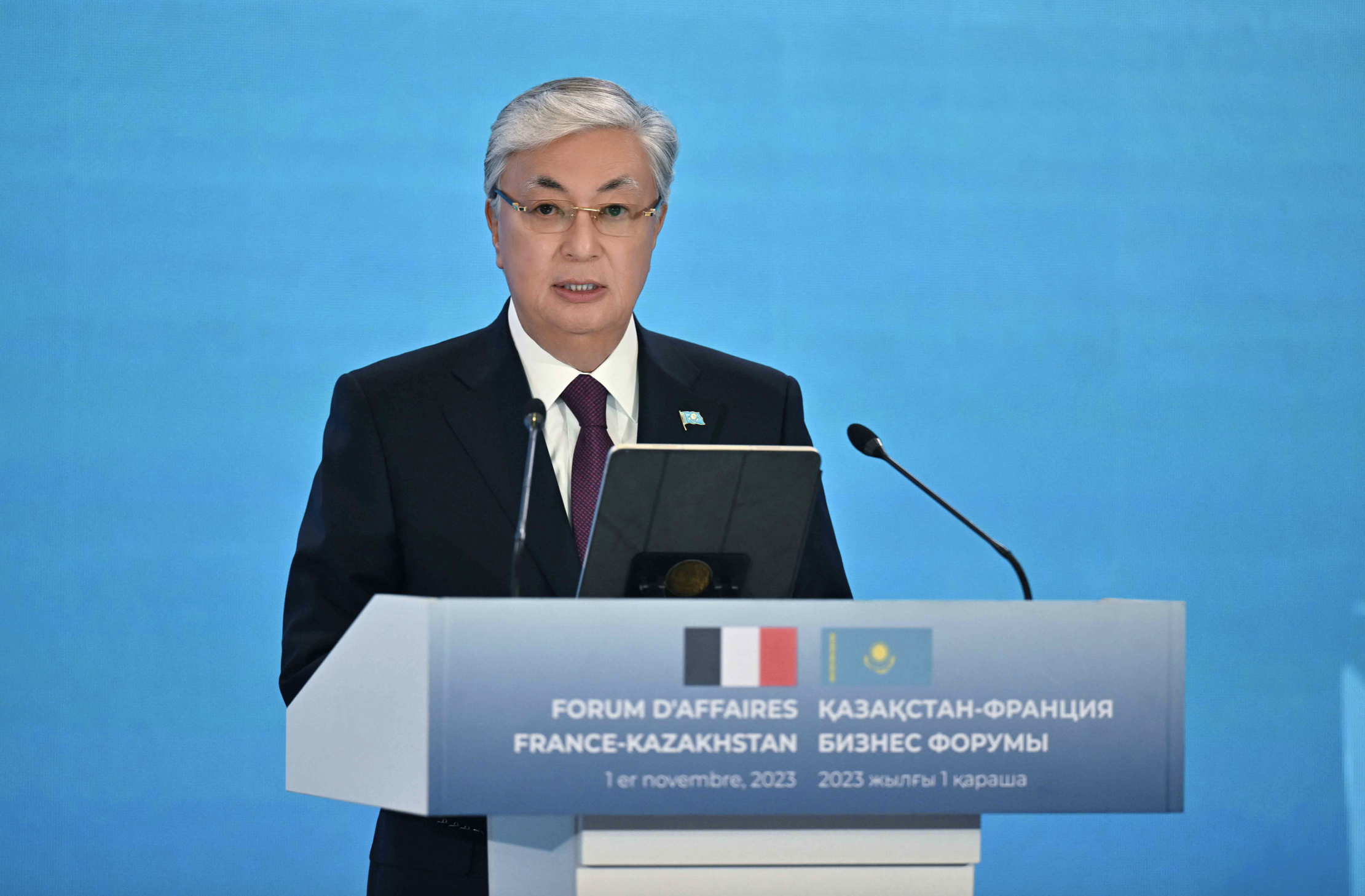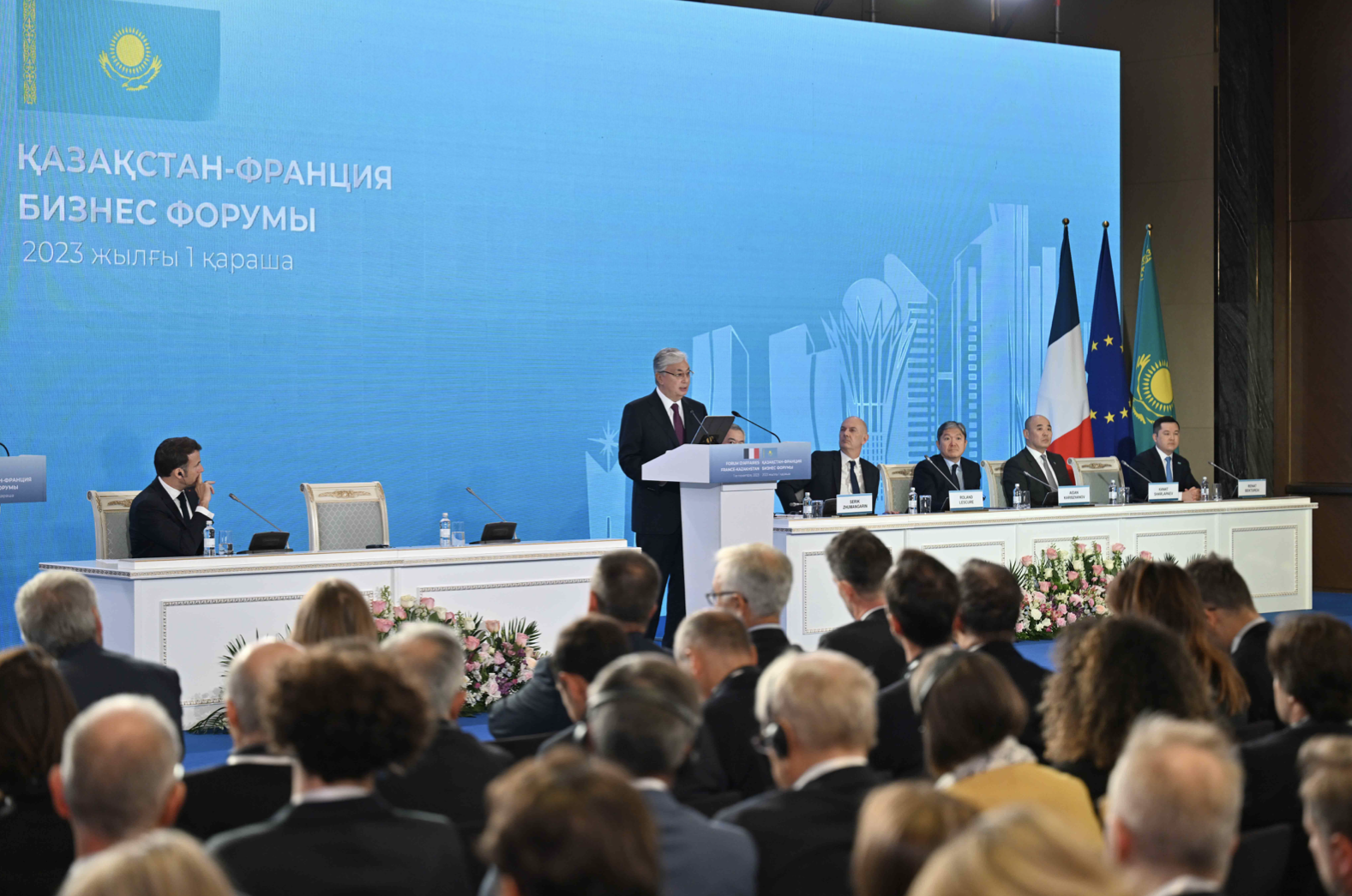ASTANA – Kazakh President Kassym-Jomart Tokayev and French President Emmanuel Macron made statements on the prospects of bilateral economic cooperation during the Kazakhstan-France Business Forum, as part of President Macron’s official visit to Astana on Nov. 1.

President of France Emmanuel Macron. Photo credit: Akorda.
Since the establishment of diplomatic relations 31 years ago, a solid political dialogue has provided the backbone for a growing cooperation in trade and investment between Kazakhstan and France.
This year, Kazakhstan registered its economic growth at 4.7%. Non-oil sectors showcase the biggest progress and foreign direct investment (FDI) remains a driving force for the country’s economic development. Pursuing a strategic goal of doubling the economy by 2029, Kazakhstan is committed to raising its standards, regulations, and business practices to meet the Organization for Economic Cooperation and Development (OECD) level.
“Last year, our bilateral trade increased by 30% – to $4 billion. This positive trend continues this year. France is one of the largest international investors in our economy, injecting almost $19 billion. In the first six months of this year, we recorded an impressive 50% increase in FDI to Kazakhstan from our French partners. This is a sign of high confidence in Kazakhstan,” said Tokayev.
Kazakhstan is home to nearly 200 French companies, including TotalEnergies, Orano, and Air Liquide in energy production, Alstom in railway transport, and Lactalis and Danone in agriculture.
In his welcoming speech, President Tokayev outlined promising areas for cooperation between Kazakhstan and France – the energy sector, critical minerals exploration, agricultural and food industry, transport and logistics, biotechnology and pharmaceuticals.
Energy
Kazakhstan has 12% of the world’s uranium resources. It is also the biggest supplier of uranium to France.

President of Kazakhstan Kassym-Jomart Tokayev. Photo credit: Akorda.
“Kazakhstan is the world’s top uranium producer, contributing over a quarter of nuclear fuel consumed in Europe,” noted Tokayev.
With the second largest proven oil reserves in Eurasia, Kazakhstan remains one of the main suppliers of crude oil to the French market. Data from the French Ministry of Energy Transition confirms that Kazakhstan was its second-biggest source of crude oil last year, down from first place in 2021.
“With nuclear power comprising 63% of France’s energy sector, there is a vast potential for cooperation. Our interests also converge on the goal of a net-zero carbon future. Just like France, Kazakhstan is a regional pioneer in this area. When it comes to renewable energy, a growing number of major international players are coming to pursue sizable wind, solar and hydro projects. One of them is French Total Energies’ $1.3 billion investment for the development of a 1 gigawatt wind farm,” he said.
The Kazakh President underlined the country’s readiness to adopt best global practices in the energy sector.
“There is enormous potential on green hydrogen as well. With the right partnerships, Kazakhstan can become a top-10 exporter. We look forward to more cooperation in this vital sector, whether it involves production, transfer of technology, or expertise,” he said.
Critical minerals exploration and development
Today, Kazakhstan produces 16 out of 30 rare earth materials critical for the European Union (EU) economy covering 70% of the European phosphorus market.

Photo credit: Akorda.
“As the global technological revolution progresses, demand for rare metals will grow exponentially. Broadly, demand is expected to quadruple by 2040, while the needs for lithium will grow by 10 times. Kazakhstan, with some 5,000 unexplored deposits valued at over $46 trillion, can be a reliable partner to jointly develop that niche. We possess deposits for nine more kinds that can be exploited with the necessary investment,” said the head of state.
President Tokayev invited French companies to join the “win-win” partnership, reflecting a synergy of resources and expertise.
Agricultural and food industry
Kazakhstan, the ninth largest country in terms of landmass with 74% of its territory suitable for agriculture, has great prospects in the agri-food sector. Global food security challenges highlight the need for its development.
Given international food deficits, Kazakhstan aims to increase the productivity of the agri-food sector by three times and to double exports.
President Tokayev noted that high-tech innovation in animal husbandry, meat, and crop production is also of particular interest.
Transport and logistics
Kazakhstan has become the main regional hub with a modern multimodal and sustainable infrastructure system.
The Trans-Caspian International Transport Route (TITR), or the so-called Middle Corridor, Tokayev said, “is not only the shortest but also the most viable route to secure supply chains between Europe and Asia.”
“In anticipation of increasing volumes, we are working with our partners to modernize infrastructure with an annual goal of 10 million tons of cargo. Now, it is important to link these efforts with the Trans-European Transport Network (TEN-T) and the European Union Global Gateway initiative,” he said.
Macron described Kazakhstan as a “natural bridge of autonomy between Europe and Asia.”
“Obviously, you are part of important roads with surrounding big partners. It is good to have our own roads and our own corridor [referring to the Middle Corridor]. We want to be part of this connectivity project,” said the French leader.
Macron mentioned that common actions are aimed at the continuous transformation of Kazakhstan and the Central Asian region.
“I think the geopolitical view is the one we share, making this part of the world not part of conflict or useless aggressive competition, but a part of cooperation,” he noted.
Biotechnology and medicine
Biotechnology and medicine are evolving rapidly. Kazakh scientists have shown remarkable agility in developing and producing an effective and safe COVID-19 vaccine in the midst of a pandemic.
Tokayev commended bilateral cooperation in developing the biotech cluster, particularly the agreement between the Boehringer Ingelheim French company and the QazBioPharm national pharmaceutical in producing a vaccine against anthrax.
“We hope that the project will pave the way for future research in the pharmaceutical market, which is now one of the most fast-growing,” said Tokayev.
Astana International Financial Centre (AIFC)
The open-door policy to foreign investment remains Kazakhstan’s strategic priority. Kazakhstan made a major step in creating better conditions for investors when it adopted the Common Law of England and Wales as the legal modus operandi of the Astana International Financial Centre (AIFC), a regional hub that allows foreign businesses and financial institutions to tap into the Eurasian markets.
“Today over 2,100 companies based in 78 countries work at AIFC, facilitating investment capital not only for Kazakhstan but also across the entire region. We would warmly welcome more French companies within AIFC and the opening of a first French bank in Kazakhstan. It would give a strong impetus to our investment and financial cooperation,” said Tokayev.
“Nasdaq [the U.S. stock exchange] and the Shanghai Stock Exchange have become shareholders in the Astana International Exchange (AIX),” he added.
Tokayev welcomed French companies to conduct activities within AIFC and suggested the opening of the first French bank in Kazakhstan. “It will give strong impetus to our investment and financial cooperation with France,” he noted.
French President Macron expressed gratitude to Kazakh partners for organizing the business forum. He commended the strengthening of economic ties between Kazakhstan and France, particularly the signing of new investment agreements in the energy sector, agriculture, pharmaceuticals, transport, and logistics.
“Today, we gathered to celebrate the 15-year anniversary of our cooperation. Over these 15 years, we have managed to establish a roadmap [for Kazakhstan-France economic cooperation till 2030], and it is going in the right direction,” he said.
French companies in Kazakhstan, Macron noted, make Kazakhstan “the main trade partner in Central Asia for France, particularly in energy and exploration of deposits in the Caspian Sea.”
Economic partnership
President Macron highlighted positive dynamics in economic partnership, bringing an example of the recently launched first electric trains by Alstom, the French multinational rolling stock manufacturer, and Kazatomprom national atomic company.
“This partnership is a testament to the trust of French companies in Kazakhstan, and to the reforms the country is carrying out. Today is the time for new challenges, which are emerging nonstop,” he noted.
Kazakhstan, Macron emphasized, is a “very good partner in the oil business and a very important provider.”
“I want to thank you for providing security, and you just reaffirmed your readiness to continue doing so,” he noted, addressing Kazakh and French business representatives and government officials.
Kazakhstan is now boosting gas generation, developing clean energy projects, and reducing greenhouse gas emissions to reach carbon neutrality by 2060.
“In this way, you can count on France, on our announced commitments. What we signed this morning with the French Agency for Development is a very important step forward because we will accompany you in this move [the construction of a new wind plant], sharing best-in-class technology. French companies want to be part of Kazakhstan’s willingness to reduce carbon footprint,” said Macron.
Rare earth metals – a path to economic sovereignty
The second topic he raised was the economic sovereignty of Kazakhstan, which depends on the country’s potential in mining and metallurgical operations.
In Macron’s view, both Kazakhstan and France need more rare earth materials for economic sovereignty and building a long-term partnership in this direction.
“We will be part of the common adventure, because we want to secure capacity-building and to accompany Kazakhstan, as well to obtain a better knowledge on how to help in exploitation and develop technical partnership,” he said.
The French President commended the signing of new investment agreements on Nov.1. He expressed readiness to enhance partnerships in all promising areas.

